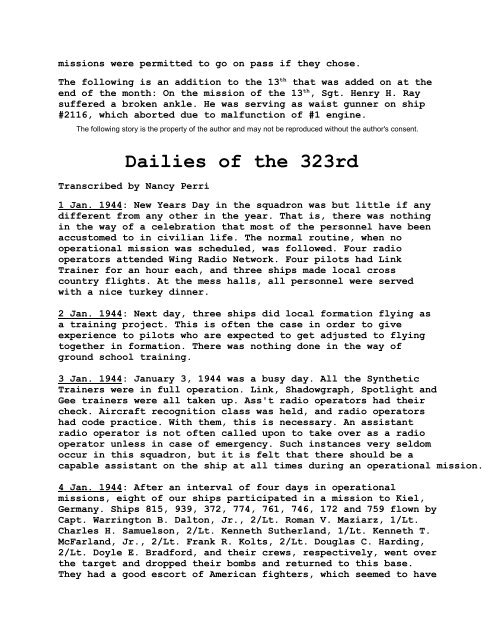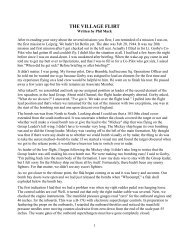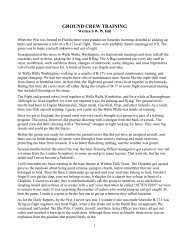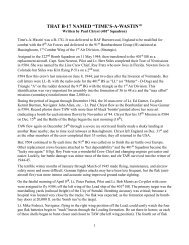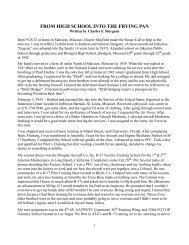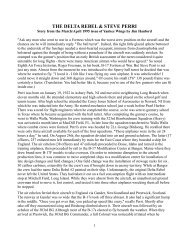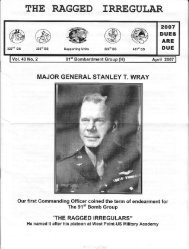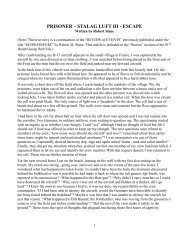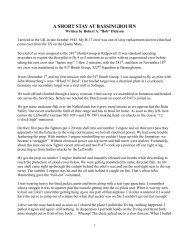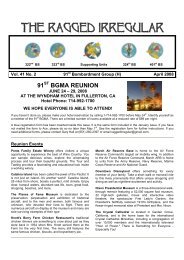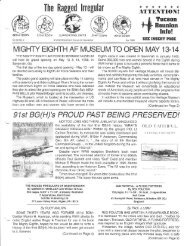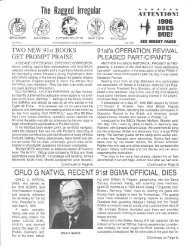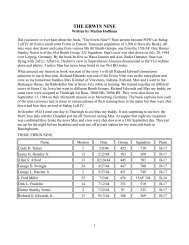Dailies of the 323rd - the 91st Bomb Group!
Dailies of the 323rd - the 91st Bomb Group!
Dailies of the 323rd - the 91st Bomb Group!
Create successful ePaper yourself
Turn your PDF publications into a flip-book with our unique Google optimized e-Paper software.
missions were permitted to go on pass if <strong>the</strong>y chose.<br />
th<br />
The following is an addition to <strong>the</strong> 13 that was added on at <strong>the</strong><br />
th<br />
end <strong>of</strong> <strong>the</strong> month: On <strong>the</strong> mission <strong>of</strong> <strong>the</strong> 13 , Sgt. Henry H. Ray<br />
suffered a broken ankle. He was serving as waist gunner on ship<br />
#2116, which aborted due to malfunction <strong>of</strong> #1 engine.<br />
The following story is <strong>the</strong> property <strong>of</strong> <strong>the</strong> author and may not be reproduced without <strong>the</strong> author's consent.<br />
<strong>Dailies</strong> <strong>of</strong> <strong>the</strong> <strong>323rd</strong><br />
Transcribed by Nancy Perri<br />
1 Jan. 1944: New Years Day in <strong>the</strong> squadron was but little if any<br />
different from any o<strong>the</strong>r in <strong>the</strong> year. That is, <strong>the</strong>re was nothing<br />
in <strong>the</strong> way <strong>of</strong> a celebration that most <strong>of</strong> <strong>the</strong> personnel have been<br />
accustomed to in civilian life. The normal routine, when no<br />
operational mission was scheduled, was followed. Four radio<br />
operators attended Wing Radio Network. Four pilots had Link<br />
Trainer for an hour each, and three ships made local cross<br />
country flights. At <strong>the</strong> mess halls, all personnel were served<br />
with a nice turkey dinner.<br />
2 Jan. 1944: Next day, three ships did local formation flying as<br />
a training project. This is <strong>of</strong>ten <strong>the</strong> case in order to give<br />
experience to pilots who are expected to get adjusted to flying<br />
toge<strong>the</strong>r in formation. There was nothing done in <strong>the</strong> way <strong>of</strong><br />
ground school training.<br />
3 Jan. 1944: January 3, 1944 was a busy day. All <strong>the</strong> Syn<strong>the</strong>tic<br />
Trainers were in full operation. Link, Shadowgraph, Spotlight and<br />
Gee trainers were all taken up. Ass't radio operators had <strong>the</strong>ir<br />
check. Aircraft recognition class was held, and radio operators<br />
had code practice. With <strong>the</strong>m, this is necessary. An assistant<br />
radio operator is not <strong>of</strong>ten called upon to take over as a radio<br />
operator unless in case <strong>of</strong> emergency. Such instances very seldom<br />
occur in this squadron, but it is felt that <strong>the</strong>re should be a<br />
capable assistant on <strong>the</strong> ship at all times during an operational mission.<br />
4 Jan. 1944: After an interval <strong>of</strong> four days in operational<br />
missions, eight <strong>of</strong> our ships participated in a mission to Kiel,<br />
Germany. Ships 815, 939, 372, 774, 761, 746, 172 and 759 flown by<br />
Capt. Warrington B. Dalton, Jr., 2/Lt. Roman V. Maziarz, 1/Lt.<br />
Charles H. Samuelson, 2/Lt. Kenneth Su<strong>the</strong>rland, 1/Lt. Kenneth T.<br />
McFarland, Jr., 2/Lt. Frank R. Kolts, 2/Lt. Douglas C. Harding,<br />
2/Lt. Doyle E. Bradford, and <strong>the</strong>ir crews, respectively, went over<br />
<strong>the</strong> target and dropped <strong>the</strong>ir bombs and returned to this base.<br />
They had a good escort <strong>of</strong> American fighters, which seemed to have


